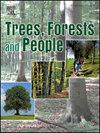“Odum will take forever to grow”: The political ecology of agroforestry in Ghana
IF 2.7
Q1 FORESTRY
引用次数: 0
Abstract
Reforestation through agroforestry is a common practice in the tropics but the political structures and processes as well as the ecological factors that define their outcomes need more attention. We employed mixed methods with insights from political ecology to enhance the understanding of agroforestry under the modified taungya system (MTS) in Ghana. The study reveals that the MTS is defined by governmentality and discursive power informed by the broader political economy. Specifically, economic and ecological factors intersect with environmental politics to inform the choice of tree species being used for the agroforestry. Additionally, the power dynamics across scale create differentiated access to degraded forest reserves and push less powerful people to the background. More so, power struggles, inhibiting structures, and politics of the sharing of tree revenue within the system contribute to some farmers devising illegal means to have, and maintain access, to degraded forest reserves which are creating negative consequences to the agroforestry initiative. We recommend that the Forestry Commission should (re)sensitise all forest-fringe communities, provide opportunities for a meaningful participation of all stakeholders of the MTS and sign the agreement on the sharing of tree revenue with participating farmers. It is also important that more women are targeted and assigned degraded forest reserves directly, as they are more compliant with the required practices of the MTS.
求助全文
约1分钟内获得全文
求助全文
来源期刊

Trees, Forests and People
Economics, Econometrics and Finance-Economics, Econometrics and Finance (miscellaneous)
CiteScore
4.30
自引率
7.40%
发文量
172
审稿时长
56 days
 求助内容:
求助内容: 应助结果提醒方式:
应助结果提醒方式:


